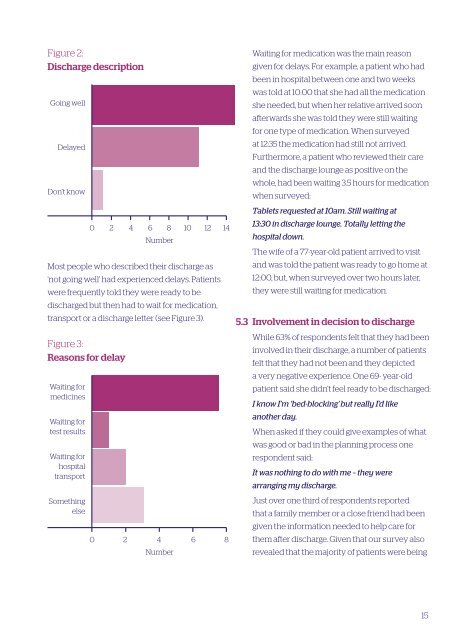Hospital Discharge
WhxH309YqS1
WhxH309YqS1
Create successful ePaper yourself
Turn your PDF publications into a flip-book with our unique Google optimized e-Paper software.
Figure 2:<br />
<strong>Discharge</strong> description<br />
Going well<br />
Delayed<br />
Don’t know<br />
Most people who described their discharge as<br />
‘not going well’ had experienced delays. Patients<br />
were frequently told they were ready to be<br />
discharged but then had to wait for medication,<br />
transport or a discharge letter (see Figure 3).<br />
Figure 3:<br />
Reasons for delay<br />
Waiting for<br />
medicines<br />
Waiting for<br />
test results<br />
Waiting for<br />
hospital<br />
transport<br />
Something<br />
else<br />
0 2 4 6 8 10 12 14<br />
Number<br />
0 2 4 6 8<br />
Number<br />
5.3<br />
Waiting for medication was the main reason<br />
given for delays. For example, a patient who had<br />
been in hospital between one and two weeks<br />
was told at 10:00 that she had all the medication<br />
she needed, but when her relative arrived soon<br />
afterwards she was told they were still waiting<br />
for one type of medication. When surveyed<br />
at 12:35 the medication had still not arrived.<br />
Furthermore, a patient who reviewed their care<br />
and the discharge lounge as positive on the<br />
whole, had been waiting 3.5 hours for medication<br />
when surveyed:<br />
Tablets requested at 10am. Still waiting at<br />
13:30 in discharge lounge. Totally letting the<br />
hospital down.<br />
The wife of a 77-year-old patient arrived to visit<br />
and was told the patient was ready to go home at<br />
12:00, but, when surveyed over two hours later,<br />
they were still waiting for medication.<br />
Involvement in decision to discharge<br />
While 63% of respondents felt that they had been<br />
involved in their discharge, a number of patients<br />
felt that they had not been and they depicted<br />
a very negative experience. One 69- year-old<br />
patient said she didn’t feel ready to be discharged:<br />
I know I’m ‘bed-blocking’ but really I’d like<br />
another day.<br />
When asked if they could give examples of what<br />
was good or bad in the planning process one<br />
respondent said:<br />
It was nothing to do with me – they were<br />
arranging my discharge.<br />
Just over one third of respondents reported<br />
that a family member or a close friend had been<br />
given the information needed to help care for<br />
them after discharge. Given that our survey also<br />
revealed that the majority of patients were being<br />
15


